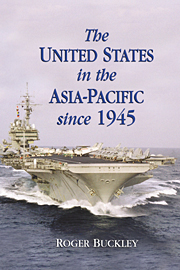Book contents
- Frontmatter
- Contents
- List of Maps
- Preface
- Abbreviations
- Introduction
- 1 Postwar: Asia-Pacific, 1945–1950
- 2 War: Korea, 1950–1953
- 3 Postwar: Asia-Pacific, 1953–1960
- 4 War: Vietnam, 1960–1975
- 5 Postwar: Asia-Pacific, 1975–1989
- 6 Post-Cold War: Asia-Pacific, 1989–2000
- 7 Future: Asia-Pacific, 2001–2020
- 8 Conclusions
- Select Bibliography
- Index
3 - Postwar: Asia-Pacific, 1953–1960
Published online by Cambridge University Press: 06 January 2010
- Frontmatter
- Contents
- List of Maps
- Preface
- Abbreviations
- Introduction
- 1 Postwar: Asia-Pacific, 1945–1950
- 2 War: Korea, 1950–1953
- 3 Postwar: Asia-Pacific, 1953–1960
- 4 War: Vietnam, 1960–1975
- 5 Postwar: Asia-Pacific, 1975–1989
- 6 Post-Cold War: Asia-Pacific, 1989–2000
- 7 Future: Asia-Pacific, 2001–2020
- 8 Conclusions
- Select Bibliography
- Index
Summary
I think the Japanese were extremely fortunate to have the Americans as their conquerors. I've always told them that, too. Oh, they were lucky.
Sir George Sansom, 1957In the struggle between the socialist and capitalist camps, it was no longer the West wind that prevailed over the East wind, but the East wind that prevailed over the West wind … they are also divided internally. Earthquakes are likely to occur over there.
Mao Tse-tung to Chinese students in Moscow, 17 November 1957Vietnam is not a gift of nature.
Introduction by Tran Van Dinh to Le Duan, This Nation and Socialism are One (Chicago, 1976)‘In terms of power, and especially of military power, China already overshadows the area.’ So began the Foreign Office's pessimistic statement on the political background to the Asia-Pacific region in the summer of 1960. In an exercise that reviewed developments since the Korean War, British officials noted that the PRC's
own strength is supplemented by that of the two Communist bloc satellites, North Korea and North Vietnam. But for the presence of Western forces, and especially of the strategic nuclear deterrent, the rest of the area, with the exceptions of Korea, Vietnam, Formosa and the Indian subcontinent (in all of which the indigenous forces depend largely on Western logistic support and Western arms and equipment), would be a military power vacuum.
In opposition to what the Foreign Office termed in the prevailing Cold War jargon ‘the free countries’, there stood a formidable Communist grouping.
- Type
- Chapter
- Information
- The United States in the Asia-Pacific since 1945 , pp. 83 - 123Publisher: Cambridge University PressPrint publication year: 2002



